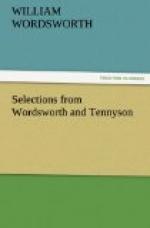There is a comfort in the strength of
love;
’Twill make a thing endurable, which
else
Would overset the brain, or break the
heart: 450
I have conversed with more than one who
well
Remember the old Man, and what he was
Years after he had heard this heavy news.
His bodily frame had been from youth to
age
Of an unusual strength. Among the
rocks 455
He went, and still looked up to sun and
cloud,
And listened to the wind; and, as before,
Performed all kinds of labor for his sheep,
And for the land, his small inheritance.
And to that hollow dell from time to time
460
Did he repair, to build the Fold of which
His flock had need. ’Tis not
forgotten yet
The pity which was then in every heart
For the old Man—and ’tis
believed by all
That many and many a day he thither went,
465
And never lifted up a single stone.
There by the Sheep-fold, sometimes was
he seen
Sitting alone, or with his faithful Dog,
Then old, beside him, lying at his feet.
The length of full seven years, from time
to time 570
He at the building of this Sheep-fold
wrought,
And left the work unfinished when he died.
Three years, or little more, did Isabel
Survive her Husband; at her death the
estate
Was sold, and went into a stranger’s
hand. 475
The Cottage which was named the evening
star
Is gone,—the ploughshare has
been through the ground
On which it stood; great changes have
been wrought
In all the neighborhood:—yet
the oak is left,
That grew beside their door; and the remains
480
Of the unfinished Sheep-fold may be seen
Beside the boisterous brook of Green-head
Ghyll.
2. Green-head Ghyll. Near
Dove Cottage, Wordsworth’s home at Grasmere.
Ghyll. A short, steep, and narrow valley with a stream running through it.
5. The pastoral mountains. In Professor Knight’s Life of Wordsworth are found fragments which the poet intended for Michael and which were recovered from Dorothy Wordsworth’s manuscript book. Among these are the following lines, which as Professor Dowden suggests, are given as Wordsworth’s answer to the question, “What feeling for external nature had such a man as Michael?” The lines, which correspond to lines 62-77 of the poem, are as follows;
“No doubt if you in terms direct
had asked
Whether beloved the mountains, true it
is
That with blunt repetition of your words
He might have stared at you, and said
that they
Were frightful to behold, but had you
then
Discoursed with him . . . . . . . .
Of his own business and the goings on
Of earth and sky, then truly had you seen
That in his thoughts there were obscurities,
Wonder and admiration, things that wrought
Not less than a religion of his heart.”




